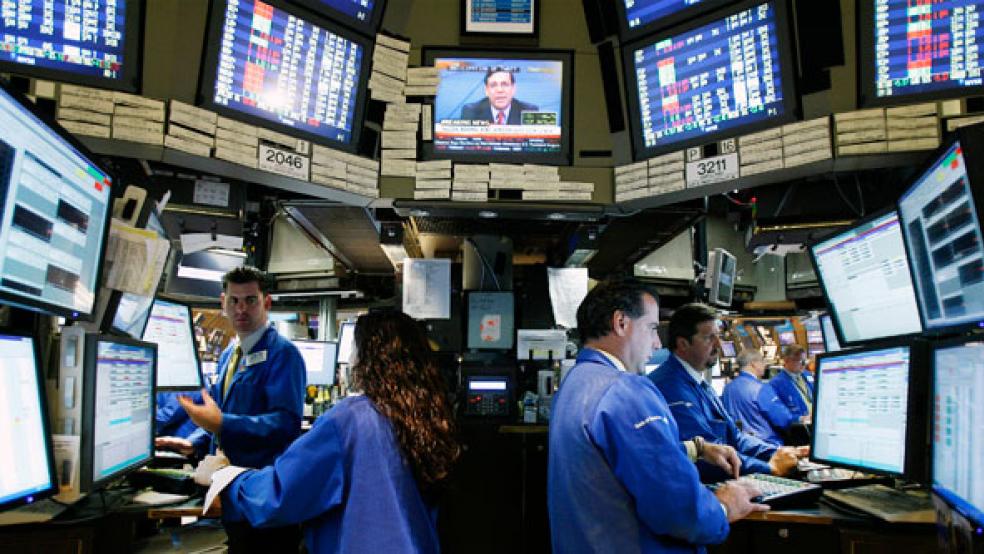The S&P 500 stock index's stunning run since the start of the year has made many bullish analysts look conservative.

As the benchmark S&P has roared to record highs this year with a gain of more than 11 percent, many Wall Street analysts have been forced to concede their prior targets were too low and adjust accordingly. In fact, it has taken less than four months for the S&P to surpass year-end 2013 targets of about two-thirds of the strategists polled by Thomson Reuters in December. Of 47 analysts surveyed, 30 of them expected to see this year end at a level already exceeded by the index.
The midyear targets are even more lopsided, as the S&P is above the midyear forecast for 27 of the 28 analysts who estimated where the index would be by the end of June.
RELATED: Will a Consumer Pullback Sink the Stock Market Rally?
"When we started the year at 1,425 that implied about a 15 or 20 percent total return," said Phil Orlando, chief equity market strategist, at Federated Investors, in New York, who has a 1,660 year-end target for the index. "Here we are now 3 1/2 months into the new year and stocks are up 11, 12 percent - there's not a whole lot left. Either there's going to be a pullback at some point, or maybe things really get even better than we thought and our 1,660 target is too low."
The more recent Reuters poll in March showed some analysts had revised targets following the strong start to the year, with the S&P above the midyear target for 21 of 34 analysts surveyed and the full-year target for 18 of 43 analysts surveyed. The run has been notable for its resilience. As investors buy into weakness, dips are short-lived while bears are forced to cover short positions and asset managers chase performance.
So far this year, the S&P has only experienced three consecutive losing sessions once, and the deepest "correction" was a brief 2.8 percent slide in late February.
Thomas Lee, U.S. equity strategist at JPMorgan in New York, this week decided to throw in the towel on a call for a correction, saying in two recent notes to clients that his 1,580 target for the year-end S&P "seems low." Data in the last six weeks has not been as weak as some expected, and the equity market managed to look past it, anyway. Lee, in his commentary, notes that JP Morgan estimates 2013 currently is the worst year for active-manager performance since 1995, with an estimated 68 percent of funds falling short of their benchmark. Fund managers, as a result, are taking on more risks in order to play catch-up, he wrote.
Now that Lee is more bullish, he noted the biggest risk to this new view is "that the market begins to correct just as we capitulate on it happening. That is potential irony."
Fred Dickson, chief market strategist at D.A. Davidson & Co in Lake Oswego, Oregon, who is maintaining his target of 1,450 for midyear and 1,500 for the year-end sees a strong likelihood of a significant pullback, partly due to the current market structure which contains a large number of program-driven traders that follow trends.
"It will take a combination of fundamental events to pull people from a buying mode onto the sidelines and when that happens we will start to see prices decline. As those prices decline the program traders flip the switch from buy to sell or buy to short and you get a fairly rapid 8 to 10 percent decline," said Dickson.
One potential catalyst for a pullback could be company results as the pace of earnings season begins to pick up. Earnings for S&P 500 companies are expected to grow at a modest 1.1 percent in the first quarter, down from a January forecast of more than 4 percent, according to Thomson Reuters data. Just 6 percent of companies have reported thus far, but companies so far have been notably pessimistic, with a 4.7-to-1 ratio of negative to positive warnings.
"The only thing that happens now is do we start to see something in the company earnings reports - these are really important because that is where the rubber meets the road," said Gordon Charlop, managing director at Rosenblatt Securities in New York.
Next week 74 S&P companies are expected to report results, across a wide swath of sectors. Financials dominate the week, including reports from American Express Co (AXP.N), Goldman Sachs (GS.N), Bank of America (BAC.N) and Citigroup Inc (C.N).
Internet companies Google Inc (GOOG.O) and Yahoo Inc (YHOO.O), along with Dow components Johnson & Johnson (JNJ.N), Coca-Cola (KO.N), McDonald's Corp (MCD.N) and General Electric (GE.N) also report results. In addition to earnings, investors will also scrutinize regional manufacturing data from the New York and Philadelphia Federal Reserve banks, the Fed's Beige Book and data on consumer inflation and housing starts.
Additonal reporting by Caroline Valetkevitch of Reuters.




